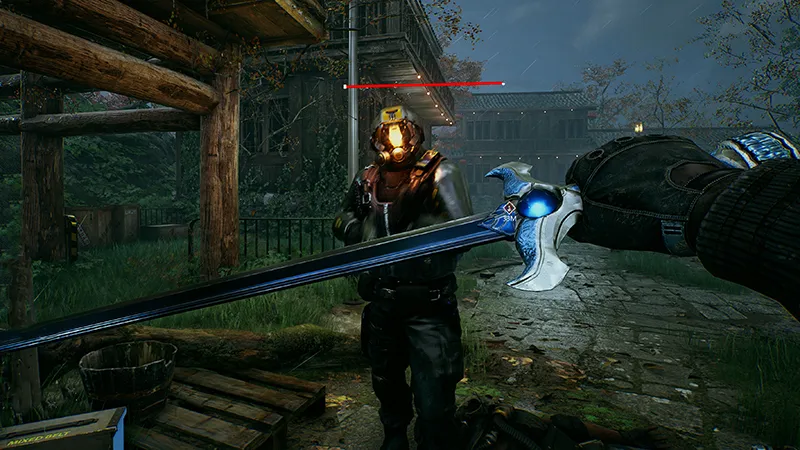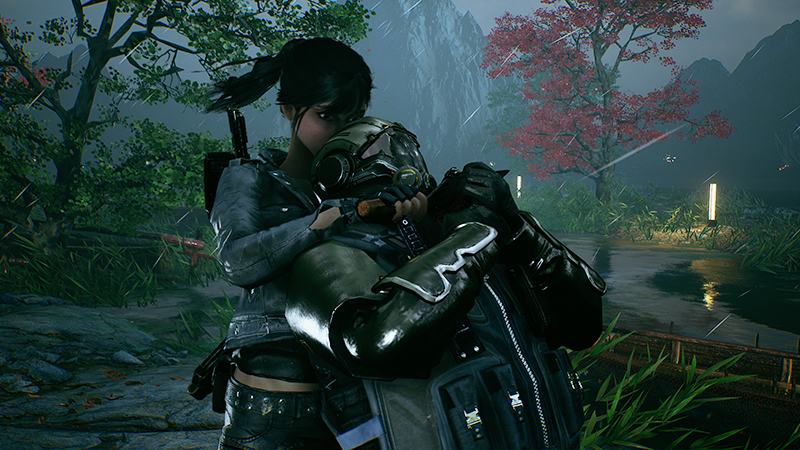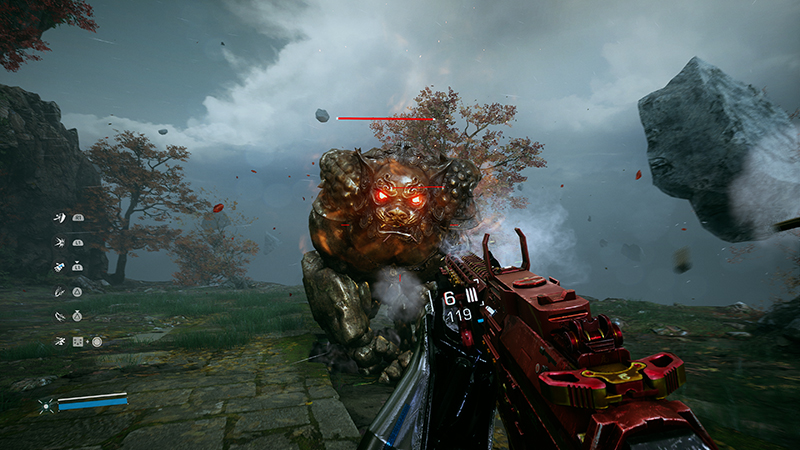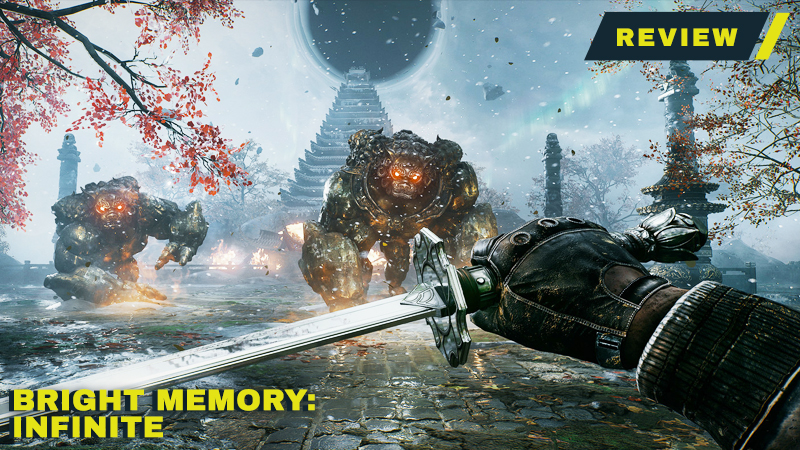Bright Memory: Infinite began as Bright Memory, a lone episode that garnered attention because of its visuals and gunplay that looked too good to be developed mostly by a single person. It was incredibly short, though, something this second episode turned full-length title would seemingly address. Bright Memory: Infinite is roughly triple the length and has similarly frenetic gameplay, but it’s still all too abrupt — and a little unpolished — for its own good.
Infinite’s high-octane gameplay comes from its hybrid of melee combat and first-person shooting. It sounds like a recipe for disaster or one that results in two similarly anemic systems, but Infinite balances both splendidly. Gunplay is akin to Titanfall 2, where acrobatics and quick movement dictate the overall pacing. Dashing and double jumping around is smooth because of the snappy controls and even though the four guns are all simple archetypes, they fill their role and have useful alternate fires that give them more utility. Wall running is clunky and the grappling beam is woefully underutilized and weirdly implemented, but using the other tools together makes Infinite a decent entry in the modern landscape of more mobile shooter first-person shooters.

Its melee combat is less conventional and more interesting because it benefits from the same responsive controls but in a different way. Aside from the standard quick slash with the sword, it’s also possible to launch enemies in the air, yank them around, and deflect their attacks. It sounds a bit like Devil May Cry because it is, as manipulating foes in such ways yields a liberating amount of choice during combat. Flinging a soldier into the air, slashing at him a few times, and then finishing him off with a huge shotgun blast is rewarding and leads to more creativity that standard shootouts don’t always provide.
However, its defensive mechanics and upgrades help make this more than a first-person Devil May Cry. Parrying not only denies damage but also reflects bullets, quickly breaks down an enemy’s protective defensive gauge, and automatically refills the magazine of the currently selected gun. Using parries wisely means players can keep up their momentum by breaking down enemy defenses more quickly and reloading less often, both of which become crucial for dealing with waves of multiple foes where prioritization is key. There’s also an array of upgradeable skills that add even more variety, like the ground pound and obscenely overpowered rocket punch that, once fully upgraded, kills almost anything in one explosive hit. Even on hard, all of these options make the combat a fulfilling power fantasy with a refreshingly liberating arsenal and a welcome amount of choice.
Bright Memory: Infinite’s solid mechanical core is betrayed by its fragile outer shell that undermines said core or keeps it from reaching its full potential. Infinite can also be completed within an hour and a half and even though games often overstay their welcome, Infinite is not long enough to let players truly take advantage of its arsenal. It ramps up at such an impossibly fast clip and then ends abruptly before its mechanics can evolve or be fully exercised. This is most plainly seen in its upgrades and even though upgrade points are handed out at a rapid clip, many will likely not have enough to fully unlock everything and see all of what the game has to offer.
Its unique and busy control scheme alone will likely take a bit to acclimate to and further demonstrates that the campaign is just too short. Replaying the story has value because the quality of its fast action is worth experiencing again, but that’s essentially all players can do. A wave-based survival mode or remixes to the campaign would be something, as it can’t fully realize its potential when confined to such a small box. Its abbreviated runtime is even more disappointing because of the precious time it wastes on its terrible stealth section that overly punishes players for getting caught and contrives a dumb reason to steal away the powers and gear that are at the game’s beating heart.

Bugs and presentation issues also plague that heart, too. Foes will sometimes get caught in the environment or run straight at the player and not attack. Sometimes the subtitles won’t turn off, despite them being off in the options. They’re not game-breaking problems, but still annoying and sit alongside the most serious technical headaches that players are likely to experience in one form or another. Upon completing the game, it froze on a black screen when it should have started rolling credits. When booting the title again from scratch, the menus had somehow switched to Chinese and wiped all previous save data. None of the trophies for beating the game unlocked, either, adding one more dimension to this discouraging string of events.
The bugs are part of a more general issue with its presentation. Even though the game runs well and its visuals, while artistically drab, look technically impressive, its animations — especially the stealth kill ones in the forced sneaking section — are sometimes stuttery and the main character’s model is jarringly rudimentary. Not only does she look worse than the other characters in the game, but she absolutely does not match the art style and looks more like she was modded in from a hentai game built only to crank to.

Infinite could have embraced that idiosyncrasy or at least poked fun at it, but the game, to its great detriment, is far too serious for that. Dimension-hopping, sword-wielding demons and fighting on top of an airplane tumbling toward a black hole seem like great fodder for an over-the-top cheesy action game, but it presents these scenarios (and its overall story) as if they were part of some gripping, well-written drama. An opaque, poorly realized narrative like this would be better suited if it leaned into its cheesier nature, but it instead chose to be utterly unaware at how ludicrous it is and play it straight, resulting in a game that doesn’t capitalize on the personality of its over-the-top gameplay.
Bright Memory: Infinite’s hybrid gameplay mechanics that combine first-person shooting and melee swordplay are empowering and rewarding, but the game around those systems fails to highlight them. Its fast pacing grinds to a halt with its ill-suited stealth mission and its complete lack of replayability means there aren’t many ways to further enjoy its gameplay outside of playing through its occasionally janky 90-minute campaign again. Shooting and slicing during a second run is satisfying, but it’s not enough and further demonstrates how it is more of a proof of concept over a feature-complete experience. Bright Memory: Infinite is, ultimately, a demo, one with slick gunplay that deserves to grow into something more than a teaser with a painfully ironic subtitle.
SCORE: 6/10
As ComingSoon’s review policy explains, a score of 6 equates to “Decent.” It fails to reach its full potential and is a run-of-the-mill experience.










